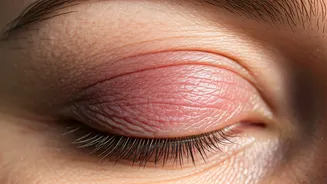Understanding Swollen Eyelids
Swollen eyelids, also known as eyelid edema, are characterized by inflammation or fluid accumulation in the tissues surrounding the eyes. This can lead
to a puffy appearance, often accompanied by redness, itching, and sometimes pain. Various factors can contribute to this condition. The appearance may be a result of something simple, like lack of sleep or allergies, but can also be caused by more serious underlying issues. Recognizing the potential causes is essential for appropriate management. Swelling can affect one or both eyelids, and the severity can fluctuate throughout the day. The condition can present itself in different ways, from a mild puffiness to significant swelling that impairs vision. Knowing the possible factors involved helps individuals determine whether medical attention is necessary. Often, it might be a temporary issue. Nevertheless, it is crucial to remain vigilant and identify any associated symptoms. Paying close attention to the swelling allows for appropriate action and possible solutions. This can involve medical consultation, the use of home remedies, and adopting lifestyle changes to alleviate the symptoms.
Common Contributing Factors
Several factors can cause the swelling of the eyelids. Allergic reactions are a significant contributor. Exposure to allergens such as pollen, pet dander, or certain cosmetics can trigger an immune response, leading to inflammation and swelling. Another usual suspect is sleep deprivation. Insufficient sleep disrupts the body's fluid balance, which can cause fluid retention and puffiness around the eyes. Infections, such as conjunctivitis (pinkeye) or cellulitis (skin infection), are common sources of eyelid swelling. These infections can cause inflammation and associated symptoms. Injury or trauma to the eye area can also lead to swelling, as the body's natural response involves inflammation to heal. In addition, certain medical conditions like thyroid disease or kidney problems can manifest as swollen eyelids. Sometimes, lifestyle factors play a role. Excessive salt intake can contribute to fluid retention, which may be evident around the eyes. The use of certain medications might also have swelling as a side effect. Therefore, being aware of these factors is vital in identifying the underlying cause and seeking appropriate treatment.
Lifestyle Adjustments
Simple lifestyle changes can help in reducing the swelling of the eyelids. Ensuring adequate sleep is critical. Aim for 7-8 hours of sleep per night to maintain the body's natural fluid balance. Elevating the head while sleeping can also assist in preventing fluid accumulation around the eyes. This can be achieved by using an extra pillow. Reducing sodium intake in your diet can help minimize fluid retention. Try to limit processed foods and salty snacks. Applying cold compresses to the swollen eyelids can provide immediate relief. This can be done by using a cool, damp washcloth or an ice pack wrapped in a cloth. Staying hydrated is also very important. Drinking enough water supports overall health and helps regulate fluid balance. Avoiding irritants and allergens is essential. Use hypoallergenic cosmetics and avoid rubbing your eyes excessively. Regular eye care can support the process of preventing swelling. Washing your face and eyes gently helps remove any irritants. These simple measures can significantly improve your symptoms. Implementing these changes as part of your daily routine could reduce the frequency and severity of swollen eyelids.
Seeking Medical Attention
While many cases of swollen eyelids are harmless and can be managed at home, it is essential to know when to seek medical help. If the swelling is severe or accompanied by other symptoms like pain, vision changes, or fever, it is necessary to consult a healthcare provider. These signs might suggest an infection or another serious health issue. If the swelling persists for more than a few days despite home care measures, consider scheduling a medical consultation. This could be due to an underlying condition needing medical attention. If you suspect an allergic reaction is causing the swelling, seek immediate medical attention if you experience difficulty breathing, dizziness, or other severe symptoms. Such symptoms are often associated with anaphylaxis, a life-threatening allergic reaction. In case you have a pre-existing medical condition, such as thyroid disease or kidney problems, consult your doctor. They can give recommendations on how the eyelid swelling should be handled in relation to your particular condition. Promptly seeking medical attention guarantees appropriate diagnosis and treatment, which contributes to the protection of your vision and overall well-being.














